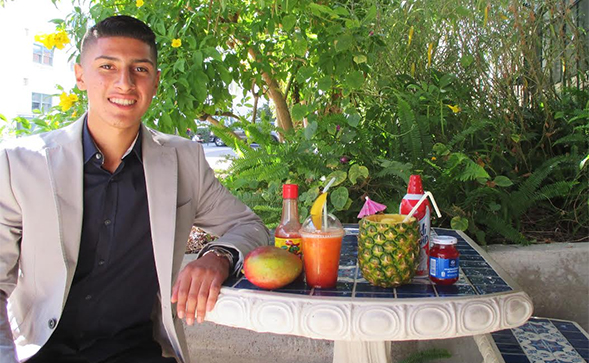Zahn Center Helps Students Pave the Way
The Zahn Innovation Center choses eight new teams for their fall admissions cycle.

San Diego State University’s Zahn Innovation Center is full of students with initiative, drive and passion for helping others. The center now has eight new teams, eager to make their dreams a reality.
The Zahn Center, SDSU’s entrepreneurship incubator, is already home to 36 teams. The center provides resources including 24/7 access to the collaborative work space and other Zahn Center facilities and guidance throughout the process such as pro bono legal support, experienced mentors and business advice. Teams can also utilize a 3D printer for prototyping and investor introductions to help their product move along smoothly.
The best of the best
Competition is fierce to become a Zahn Center team. Seventy teams from all across campus applied. Twelve were chosen as finalists, and only eight were selected.
After completing in an in-depth application process, the finalists were invited to present their products to the selection committee. Through the presentation, teams highlighted the characteristics that make their product unique as well as how it will hold up against competition, the stage of development the product is in, the problem the product is solving and the solution it provides to consumers. After presentations are made, the selection committee then reviews each team and makes a final decision.
The teams this year come from a wide range of backgrounds.
“Traditionally we get candidates from the College of Business or College of Engineering, but this time the competition was very diversified,” said Cathy Pucher, executive director of the Zahn Center.
Two teams that stuck out during the application process were junior economics student Jake Dressler and sophomore international business student Joel Lopez.
“I loved their energy and enthusiasm and preparedness of their presentations,” Pucher said. “They really stood out to me and the entire committee.”
Dressler’s product is Passbeat, which is software that adds layers of security to password log-ins by analyzing the way the user types in their passwords. Lopez’s product is Aye! Que Rico!, an authentic Hispanic fruit and refreshment bar stand. Although these products are on opposite sides of the spectrum in terms of product type, they both aim to have a social impact on the community in different ways.
Digital safety
Dressler wants to give users peace of mind when using online databases by creating an easier, more secure way of logging in.
“This is a more seamless way to add security to user’s accounts and is much easier to use than a two-step verification process. Convenience does not have to trump security,” Dressler said.
Passbeat was inspired by the nuances of musical signatures.
“Even though all musicians are playing the same keys, everyone has a slightly different way of playing those keys to make a unique beat,” Dressler said.
He wants to use this same idea to create software that recognizes the unique way user input their passwords. Currently he is working on a second prototype that can adapt to a user’s habits over time to create a more accurate profile of the user.
Grassroots inspiration
Lopez wants to bring an authentic cultural atmosphere to campus by connecting students back to their childhoods and hometowns, or by providing a product that curious students will be attracted to and want to try.
"I think it’s very important to embrace your culture, no matter what your ethnicity may be,” Lopez said. “We needed to be able to relate to our culture in some sort of way.”
He also wants to use his success to help the community by donating through sponsorships and fundraising. Lopez hopes to bring awareness to things like Hispanic orphanages and awareness to on-campus cultural Greek organizations.
Currently he is brainstorming ideas of how the shack will look, working on his logo and experimenting with new recipes. Eventually he wants to bring his products to SDSU’s farmer’s market to give students a sneak peek of how his product will look and taste.
The other teams joining the Zahn Center this round include:
- HRGB Imaging Technologies, led by Ivan Bajic, a faculty member from the College of Sciences, is a high-resolution medical imaging process can deliver faster and higher resolution MRI images with significantly less errors.
- Scientific Rehab Solutions, led by Harsimran S. Baweja, a faculty member from the College of Health and Human Services, is building an upper-limb exo-skelenton rehabilitation device built on a gaming platform for children.
- Gadget It, led by College of Business Administration student, Alicia Roberts, is a social enterprise aimed at helping women in Moroccan communities who make Argan oil by hand. By creating a simple machine for women to be more efficient in the production of Argan Oil, Gadget It will create sustainable wealth for the community.
- Genius, led by College of Engineering students Liban Sheikh and Albert Perez, is a wearable patch placed on a user’s forehead to control mobile apps on a smartphone. It uses EEG sensor and Bluetooth technology to work.
- Haweier, led by College of Arts and Letters student Boyao Xu, is an online platform with rich video content on Westerner culture to help Asian students studying in a Western country successfully participate in social settings.
- SnapCardz, led by College of Professional Studies and Fine Arts student Asha Abdullahi, is a mobile app that can very quickly create flashcards with little effort. With SnapCardz you will spend less time building flashcards and more time studying.
Opportunities for the future
Dressler and Lopez are still looking for people to join their teams. If you are interested, can contact Dressler or Lopez via e-mail.
The Zahn Center is currently accepting applications for their next admissions cycle. Online applications are due by noon on Dec. 9 and can be found on the Zahn Center website.



